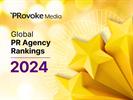Holmes Report 06 May 2011 // 11:00PM GMT
Stephen Forshaw recently departed one high-profile role - Microsoft Asia-Pacific communications director - for another. As head of communications at Singapore-owned investment firm Temasek, he takes on one of Asia’s toughest PR assignments, overseeing the sensitive reputation of a company that has attracted its share of criticism in foreign markets.
By now, Forshaw is well versed when it comes to Singapore Inc, having previously led PR and public affairs for Singapore Airlines. In an exclusive interview with the Holmes Report he talks politics, reputation and agencies.
Do you think Temasek has a big job to do in terms of its reputation outside Singapore?
I want to give that question a bit more time. As someone coming in and someone well aware of Temasek’s profile even before moving to Singapore, Temasek has a very strong reputation. Does that mean on specific transactions there will be communications challenges? Absolutely. The organisation has very strong values that it adheres to. I want to differentiate between the hurdles we face on specific transactions versus the wider reputation which is accrued over a long period of time based on the values the company puts in place and the values the company communicates to its stakeholders. My job over time is to help acquaint others with those values.
In PR terms, what attracted you to the Temasek job?
I’ve lived in Singapore for seven years. I understand that Temasek is not just a financial institution of world-class calibre, but is also integral to Singapore and its economic story. This is a country with very few natural resources, and the economy is heavily dependent on import and export flows. The role that a company like Temasek plays in Singapore’s footprint globally is very important. It’s a real opportunity to be part of a firm that is growing its international footprint . Once upon a time, Temasek was known for owning stakes in the big Singapore companies - increasingly now, the footprint is much more global. I saw an exciting challenge. That said, this role is not going to be anywhere near as high-profile as the Singapore Airlines role and I don’t intend to take the organisation down that path.
There are some people that would say Temasek gets an easier ride from the Singapore media, and that can make it difficult for the company to calibrate its PR overseas. Is that a fair observation?
No I don’t for a simple reason. Irrespective of how the media looks at Temasek, you have to take into account there are a large number of people in Singapore who are very, very interested in what Temasek does. There is a strong sense of community ownership and I think everything we do is scrutinised by Singaporeans. You can have a whole discussionn of how the media views us and others, but I’m more interested in what people think of us generally.
In my brief period here, my interaction with senior journalists here has been as robust as what they would be with the international publications. I don’t think we will get an easy ride from any of the media. We have to be engaging. That said, I don’t think Temasek is a company that goes out and seeks the limelight - we’re not going to be furnishing a lot of detail transaction by transaction but it’s about helping the media and community understand the values of Temasek.
Broadly speaking, do you think Singapore companies struggle when it comes to handling their PR outside of their home country?
I think that’s a learning curve that is not unique to Singapore companies. Any company that plays in international business has to contend with the reality that media in its home country may have a greater understanding of the role of the company than exists in the international media. All organisations have to contend with a media landscape that is increasingly diverse. The home newspaper these days is not going to be the target audience any more for many companies, you have to increasingly engage in social media etc - this is at the heart of the challenge for any modern communicator.
You are very active in social media. Do you want Temasek to be follow this example?
The first question we want to look at is, who is our audience?. We are not a consumer facing business. I do want to listen to what people are saying about us in the social media space. But when I do a search on Temasek on Twitter it’s nothing like the number of hits that we would get for Microsoft or Singapore Airlines. It’s something we are well aware of and know that we have to look at - how we plug ourselves in. But I don’t think that every organisation needs the same social media profile as a tech company or a consumer-facing organisation. It’s each to their own. Social media is a great place for us to be listening to what is happening in the financial industry generally - so in that sense it will be very important for us.
You know a few things about politics, given your background in Australia. How has social media changed the playing field in the current Singapore election?
All the parties have understood that social is connecting with people very very quickly. And that’s a change, five years since the last election. If you look at some of the existing politicians - George Yeo is a standout when it comes to social media. You’ve got to be authentic - there’s no point as a minister to resort to official-speak. George Yeo has probably been highlighted regularly as one of the best examples of a politician who has ‘got’ social media. That’s been fascinating for me to watch. It’s been a really effective campaign tool for all of them.
At Microsoft you comprehensively reviewed and reorganised your agency relationships. Do you have similar plans for Temasek?
Not at this point. We have a number of existing agency relationships. I have to say they are a lot smaller than the scope of the one I was running at Microsoft. The particular need I identified at Microsoft was that when I took on the role I had three agencies managing parts of my business and I identified that was not optimal for me. As a result of it being a big ask it was a very complex pitch process but we set about running it with very transparent criteria in mind and we communicated that to all agencies.
Here, the circumstances are very different What I am looking at is, what are the functions in which the agencies add value to what we are doing? Particularly in our overseas markets where we have no PR presence, using an agency is very important. It connects us to the local scene and gives us local context. I’m still quite new here, but I’m flagging there will be no significant change in the short term. I’ve been looking at what relationships we have with some of the agencies in overseas markets and the master relationship we have with Weber Shandwick and I’m comfortable with those. There is no one I would say is a non-performer. I expect I will fine-tune it over time, but right now I’m pretty comfortable.



































.jpg)






























